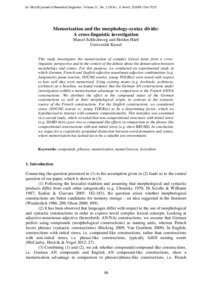| dcterms.abstract | This study investigates the memorization of complex lexical items from a cross-linguistic perspective and in the context of the debate about the demarcation between morphology and syntax. For this purpose, we conducted an experimental study in which German, French and English adjective-noun/noun-adjective combinations (e.g. Jungtourist, jeune touriste, YOUNG tourist, young TOURist) were tested with respectto how well they were memorized. Using existing nouns (e.g. Architekt, architecte, architect) as a baseline, we found evidence that the German AN constructions under investigation exhibit a memorization advantage in comparison to the French AN/NA constructions. We attribute the effect to the compound status of the German constructions as well as their morphological origin, in contrast to the syntactic source of the French constructions. For the English constructions, we considered stress (YOUNG tourist vs. young TOURist) to be a determining factor, which we hypothesized to interact with semantic compositionality. This interplay was examined in a second study, which revealed that non-compositional structures with initial stress (e.g. HARD shirt) gave rise to compound-like effects in comparison to the phrase-like compositional constructions with non-initial stress (e.g. short BRUSH). In conclusion, we argue for a cognitively grounded distinction between word-formation and syntax, where memorization has turned out to be a suitable test environment. | eng |

